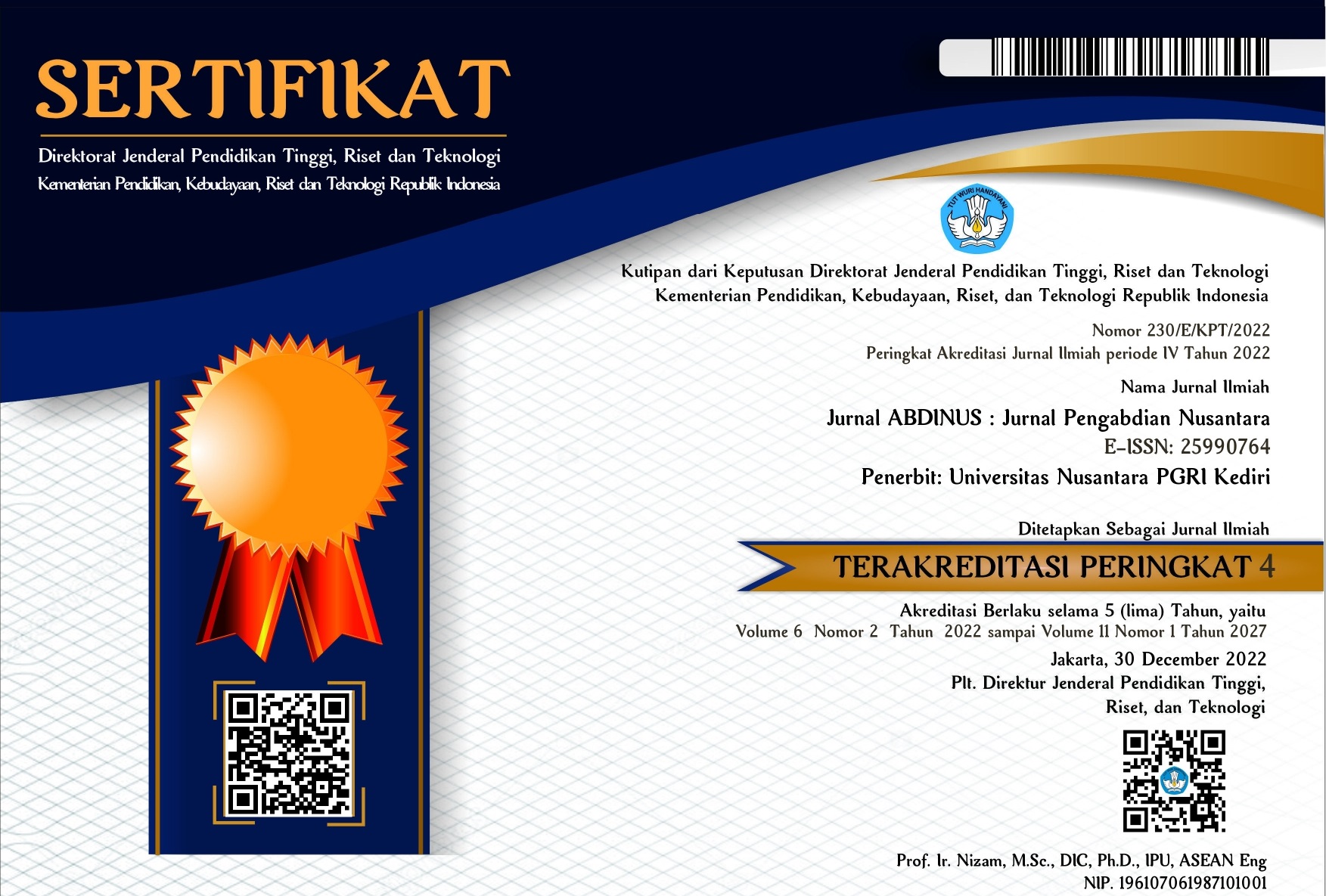Pembuatan Kertas pH dari Bahan Alam (Bunga) Sebagai Alternatif Pengganti Indikator Sintetis Di MGMP Kimia Kabupaten Donggala
DOI:
https://doi.org/10.29407/ja.v6i3.16896Keywords:
pH paper, Flower, Synthetics indicator, Acid-baseAbstract
The lack of learning resources, especially practicum infrastructure, causes practicum in schools to not be implemented. The subject of acid-base material which should be in an experiment cannot be applied due to limited indicators. The results of observations in the field showed that students could not distinguish between acidic and basic solutions because they did not get a lesson. Chemistry subject teachers in several high schools in Donggala Regency do not carry out practical work on acid-base materials because they never used natural materials such as flowers as pH paper. Therefore, it is necessary to increase the understanding of teachers regarding the concept of acids and bases and natural materials that can be used as natural indicators to replace synthetic indicators. This service activity was attended by 10 participants consisting of chemistry teachers who are members of the chemistry MGMP of Donggala Regency. Service activities are carried out by understanding the concept of acid-base and the use of natural materials as natural indicators also demonstrating and guidance on making pH paper from natural materials (flowers). This activity provides additional knowledge for teachers in the use of natural materials as a substitute for synthetic indicators in acid-base material practicum so that the quality of learning is expected to increase.
Downloads
References
Erna, M. (2015). Pembuatan dan Penentuan Range pH Kertas Lakmus Sebagai Indikator Asam Basa dari Bahan Alam Sebagai Media Pembelajaran Kimia. 2015. http://repository-universitas-riau/
Nuryanti, S., Matsjeh, S., Anwar, C., & Raharjo, T. J. (2010). Indikator Titrasi Asam-Basa dari Ekstrak Bunga Sepatu (Hibiscus rosa sinensis L) Indicator of Acid-Base Titration from the Extract of Hibiscus rosa sinensis L Flower. Jurnal Agritech, 30(3), 178–183.
Nuryanti, S., Pursitasari, I. D., & Ratman, R. (2013). Isolation of Anthocyanidin from Wora-Wari Flowers (Hibiscus rosa sinensis L.) and Its Application as Indicators of Acid-base. Jurnal Agritech, 33(03), 320–323.
Nuryanti, S., Puspitasari, D. J., & Supriadi, S. (2019). Rosella (Hibiscus sabdariffa) Flowers as Alternative Indicators of Blue and Red Litmus. Oriental Journal of Chemistry, 35(1), 476–480. https://doi.org/10.13005/ojc/350163
Nuryanti, S., Sabirin, M., Anwar, C., & Raharjo, T. J. (2012). Isolation anthocyanin from roselle petals (Hibiscus sabdariffa L) and the effect of light on the stability. Indonesian Journal of Chemistry, 12(2), 167–171. https://doi.org/10.22146/ijc.21358
Padmaningrum, R. T. (2019). Karakteristik Ekstrak warna Daun Rhoeo Siscolor sebagai Indikator Asam basa. Prosiding Seminar Nasional Penelitian, Pendidikan Dan Penerapan MIPA, Fakultas MIPA, Universitas Negeri Yogyakarta, April, 229–234. http://staffnew.uny.ac.id/upload/131930137/penelitian/Karakter_Ekstrak_Rhoeodiscolor_Regina_Tutik_P.pdf
Sudarshan, S., Bothara, S. B., Sangeeta, S., Roshan, P., & Naveen, M. (2010). Pharmaceutical Character of Flower as Natural Indicator: Acid-Base. A Journal The Pharma Research, 4(4), 83–90. https://www.yumpu.com/en/document/read/24100925/the-pharma-research-a-journal-8-3
Sumiati. (2019). Kertas Indikator Asam Basa Dari Dari Ekstrak Etanol Rimpang Tanaman Temulawak (Curcuma xanthorrhiza Roxb.). Integrated Lab Journal, 07(02), 2–9.















